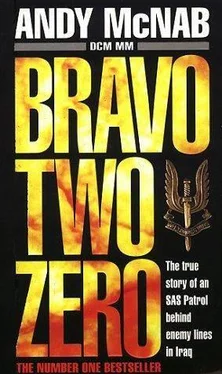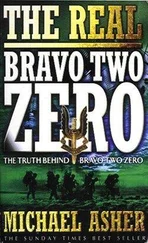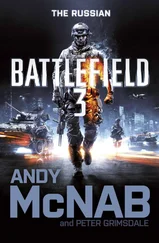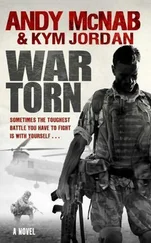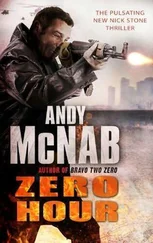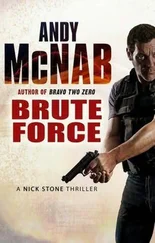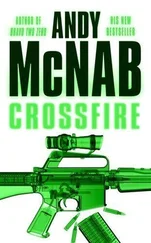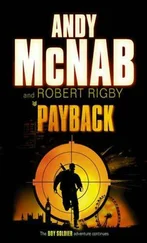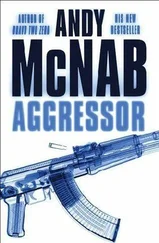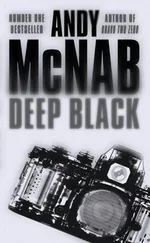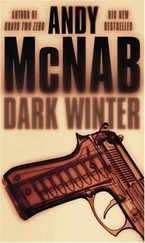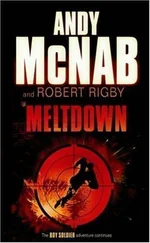In the early hours of March 5 the gates opened, and I jumped to my feet, eager with anticipation.
Russell’s door opened.
“Russell Sanborn? You’re going home.”
Then Joseph’s door.
“Joseph Small? You’re going home.”
The next one was the stretcher case.
And the last one was me.
“Andy McNab? McNab? Yes, you will be going home soon.”
They handcuffed us and took us out of the cells one by one. We went through the gates that led onto the courtyard, and then through those gates, and were put onto a bus. For the very first time I saw the bodies that belonged to the voices from other cells. Joseph Small was much older than I had imagined, a man in his mid-forties who looked good considering his injuries. All I had ever seen of Russell Sanborn was an eye and finger that pulled down a small flap of blanket so he could look out and see people slop out as we walked past his punishment cell. There was no light in his cell apart from this hole. He had a deep, booming voice, full of authority, and I had expected a man mountain. In fact he had a very slight frame.
They moved down the bus and blindfolded everybody. We drove along the road for another 75 feet and stopped. We seemed to be picking up another batch of prisoners, who sounded like Saudis. I guessed we’d been staying in a mirror image jail that had two identical wings.
We drove for about forty minutes. We stopped and I heard aero engines. This is great, I thought: We’re just going to get on the plane and fuck off. But only the Saudis disembarked. The guards then started to call out our names.
I went forward when called, still blindfolded, and was taken into a building. The echoes indicated it was a low structure; I imagined it was a hangar. We were arranged in a long line, handcuffed and blindfolded. There was a loud hiss of Tiny lamps, and the noise of soldiers moving around. I could hear the breathing of people either side of me. We were held there for a long time. My stomach was playing up again, and I was feeling weak. I leaned forward, and my nose brushed against a brick wall.
A sudden flurry of commands brought me bolt upright. I heard the ominous, metallic echo of weapons being cocked.
Well, there you go, I said to myself. So much for getting released: we’re going to get topped. I took a deep breath and waited for it.
Nothing happened. We stood there for five minutes in total silence, everybody holding their breath.
I was feeling more and more ill as we stood against the wall, and finally I buckled, collapsing on to my knees.
“I’ve got to go to the toilet,” I called out.
Somebody grabbed my arm and propelled me away, but by the time we got there I’d sprayed myself with runny stuff. I was taken back and put in the queue.
They took us one by one into tiny cells. The handcuffs were removed, and I could touch either side with my hands. But there were three blankets, a real luxury, and a little window. I needed to bang on the door every five minutes during the night. A guard appeared each time and dragged me down to the toilet, then stood over me while I dropped my arse. We spent the whole night toing and froing.
At first light we were given a good breakfast of egg, jam and bread, and hot, black tea. It was rather encouraging. I looked out of my cell and saw piles of old uniforms arranged on the floor, and yellow prison POW pajamas with pumps. I thought, this is the ticket.
An hour after breakfast, my cell door was opened, and I was led along a corridor to a room where there was a chair, table, mirror, water, and a razor.
The “barber” started to shave me, so clumsily that he ripped small chunks out of my face. Blood trickled down my chin.
“Can I do it myself?” I asked.
“No, you are a dangerous man.” They wouldn’t let me rinse my face afterwards, either. I just had to wipe the soap and blood off with my shirt.
I was taken back to the cell by two soldiers who told me to strip. They presented me with one of the yellow uniforms and took my clothes away. I said a sad, silent farewell to my escape map and compass.
“Name?”
“McNab.”
“You’ll be going home today. Very soon.” The blindfold was put back on.
The cells were opened one at a time. A soldier checked our names, removed the blindfolds, and we came out and got in line. Somebody came up to the left of me and grabbed my hand enthusiastically. “My name’s John Nichol,” he beamed.
I shook his hand. He noticed me looking at the green R.A.F polo neck under his yellow top.
“Fifteen Squadron,” he said. “Tornadoes.”
He was a really happy bloke, but not as delirious as the Americans. They were behaving as if they were already back in the States, and a few of the guards were getting twitchy about it. I was still keeping myself in check. The light was at the end of the tunnel, but who was to say it wasn’t just another guard with a Tiny lamp coming towards us?
We were blindfolded yet again and marched off in a big crocodile. After a few meters they stopped us again, and a soldier walked up and down the line spraying us with women’s perfume. I gritted my teeth. I could live with the smell, but the alcohol stung my badly shaved face.
We boarded a bus and after half an hour or so were told that we could take our blindfolds off. The bus had curtains, but I managed to look out through a gap and saw bombed bridges and buildings. Daily life was still very much going on, however. It was quite a happy time on the coach. The pilots were saying “Hi” to each other, and the guard at the front just sat there and let them get on with it.
It could be the world’s biggest bluff, however, and I decided to keep myself to myself.
We pulled up at the door of the Nova Hotel. The place was teeming with soldiers and camera crews, and there was a fleet of Red Cross vehicles. I began to feel slightly more at ease.
The main foyer was crowded with what I at first thought were Iraqis, but who turned out to be Algerian medical staff. Part of the trade-off between Saddam and the Red Cross had been that they provide medical staff for Baghdad. The Algerians lived in the hotel and helped in the local hospitals.
We were taken into one of the reception rooms and segregated by nationality for documentation. The hotel had no heating, no hot water, no lifts. There was lighting, but the Red Cross had brought everything else with them, including their own food.
This was the first time that the Red Cross had had any news about any of us from the Iraqis. Even then, the lists being handed over were corrupt. It was a breach of the Geneva Convention, but a rather minor one compared with the rest of our experiences as POWs.
I was keen to find out about Dinger and Stan.
“Have there been prisoners released before us?” I asked one of the women.
The Red Cross personnel appeared to range from women in their mid-twenties to men in their late fifties. They were incredibly brave and professional people. I wouldn’t have done their job.
“Yes. They got out via Jordan.”
“Is there any chance you can give me the names of the Brits?”
She checked a list for me and found the surnames of Dinger and Stan.
There were no other names that I recognized.
The girl confirmed that we were the last batch. So we had been the only three all along, I thought. All the stuff about wounded signals operators was a load of bollocks-a good bluff that had got me to gob off. Legs had probably been dead from the time Dinger left him.
Once the administration was done, we were given a little Red Cross ticket and a number, and the Europeans were taken upstairs to the third floor. I noticed that the fire escapes were boarded up, leaving only one way in and out through the central staircase.
Читать дальше
